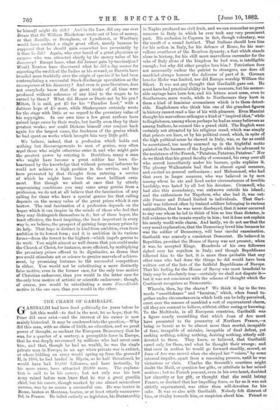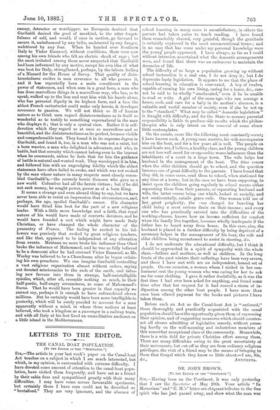THE CHARM OF GARIBALDI.
GARIBALDI had been dead politically for years before he left this world—to find in the next, let us hope, that St. Peter did once exist—and the interest of his career is now mainly historical. It may be condensed into the question,—Why did this man, with no claim of birth, no education, and no great power of thought, so enchant the European Democracy that he was, for a quarter of a century, a perceptible force in Europe, that he was deeply reverenced by millions who had never seen him, and that, though he had no wealth, he was the single private man in Europe, in an age when private war is extinct, at whose bidding an army would spring up from the ground? If, in 1880, he had landed in Illyria, as he half threatened, he would have had 10,000 followers, and have instantly, by his mere name, have attracted 20,000 more. The explana- tion is said to be his career ; but not only was his best army raised before men knew that he was a great guerilla chief, but his career, though marked by one almost miraculous success, was by no means a successful one. He was beaten in Rome, beaten at Mentana, beaten, or at least utterly unsuccess- ful, in France. He failed entirely as legislator, his Dictatorship
in Naples produced no civil fruit, and we can remember no great measure in Italy in which he ever took any very prominent
part. His seclusion in Caprera in fact, though voluntary, was the result of a sound instinct. That Italians should love him for his action in Italy, for his defence of Rome, for his mar- vellous overthrow of the Bourbon dynasty, a feat which stands alone in history, for his still more marvellous surrender for the sake of Italy alone of the kingdom he had won, is intelligible enough; but why did other peoples love him Patriotism does not necessarily endear the patriot to strangers, nor does all mankind always honour the deliverer of part of it. German love for Hofer was limited, nor did Europe worship William the Silent. It was not any thought that Garibaldi gave out. He must have had practical ability in large measure, but his memor- able sayings have been few, and his letters must seem, even to Southerners, mere words, while to Northerners they have in them a kind of feminine screaminess which is to them detest- able. Englishmen who think him one of the grandest figures in history cannot read a line of his with pleasure. Even Mazzini thought his marvellous colleague a kind of "inspired idiot," while to Englishmen, among whom perhaps he had as many believers as among Italians, he seemed like a grand child. The English were certainly not attracted by his religions creed, which was simply that priests are liars, or by his political creed, which, in spite of the high political sense he showed in Italy, was, so far as could be ascertained, too nearly summed up in the frightful motto painted on the banners of the Legion with which he advanced to the assistance of the French, "Patatras,Patatras,Patatras." Nor do we think that his grand faculty of command, his sway over all who served immediately under his banner, quite explains it. The gloomy Wallenstein had that in almost equal measure, and excited no general enthusiasm ; and Mahommed, who had that even in larger measure, who was believed in by men among whom he ate and lived under circumstances of terrible hardship, was hated by all but his devotees. Cromwell, who had also this ascendancy, was unknown outside his island; and the enthusiasm for Napoleon, who also had it, was out- side France and Poland limited to individuals. That Gari- baldi was followed often by trained soldiers belonging to various nationalities, that he was never disobeyed, that it never occurred to any one whom he led to think of him as less than dictator, is full evidence to the innate royalty in him; but it does not explain his nearly world-wide charm. And lastly, we do not see that the very usual explanation, that the Democracy loved him because he was the soldier of Democracy, will bear careful examination. Garibaldi was scarcely a consistent Democrat. He believed in Republics, provided the House of Savoy was not present; when it was, he accepted Kings. Hundreds of his own followers sighed over his royalism in Italy, and though Republicans followed him to the last, it is more than .probable that any ' other man who had done the things he did would have been written out of the lists of the faithful Republicans of Europe. That his feeliiig for the House of Savoy was most beneficial to Italy may be absolutely true—certainly we shall not dispute it— but it was not consistent with the scheme of thought which the Continent recognises as Democratic.
Wherein, then, lay the charm? We think it lay in the two words "unselfishness" and "heroism," which, when found to- gether under circumstances in which both can be fully perceived, exert over the masses of mankind a sort of supernatural charm, till they are content to believe, without either seeing or knowing. To the Multitude, in all European countries, Garibaldi was a figure nearly resembling that which Joan of Arc must have presented to the peasantry of Northern France,—a being so heroic as to be almost more than mortal, incapable of fear, incapable of mistake, incapable of final defeat, yet seeking nothing, asking nothing, desiring nothing, utterly self- devoted to them. They knew, or believed, that Garibaldi cared only for them, and what he thought their wrongs; and that once in motion he would go forward steadily, moved, as Joan of Arc was moved when she obeyed her "voices," by some internal impulse, apart from a reasoning process, until he was victorious or slain. Charles the Seventh's courtiers might doubt the Maid, or question her gifts, or attribute to her mixed motives; but no French peasant, even in his own heart, doubted her sincerity or her gift, or thought that she could betray France, or doubted that her impelling force, so far as it was not strictly supernatural, was other than self-devotion for his sake. It was so also with Garibaldi. Nobody felt distrust of him, or rivalry towards him, or suspicion about him. Friend or enemy, detractor or worshipper, no Europein doubted that Garibaldi desired the good of mankind, to the utter forget- fulness of self, and would, if once in motion, go forward to secure it, uninfluenced by any bribe, undeterred by any danger, unfettered by any fear. When he handed over Southern Italy to Victor Emanuel, without conditions, there were men among his own friends who felt an electric shock of rage ; but the most irritated among them never suspected that Garibaldi had been influenced by any motive, except his own idea of what was best for Italy, strengthened, perhaps, by the inborn feeling of a Nizzard for the House of Savoy. That quality of disin- terestedness excites in men reverence to all who possess it, and it has repeatedly been a main constituent in the power of statesmen, and when seen in a great hero, a man who has done marvellous things in a marvellous way, who has, so to speak, walked up to the lion and rent him with his hands alone, who has personal dignity in its highest form, and a face the ablest French caricaturist could make only heroic, it developes reverence to passion. We will not think so ill of human nature as to think men regard disinterestedness as in itself so wonderful as to testify to something supernatural in the man who displays it ; that is only a cynical view. Rather it is self- devotion which they regard as at once so marvellous and so beautiful, and the disinterestedness as its perfect, because visible and comprehensible test. They found it in its supreme degree in Garibaldi, and found it, too, in a man who was not a saint, but a born warrior, a man who delighted in adventure, and who, in battle, had that serenity which cannot belong even to the bravest when he commands, unless he feels that for him the guidance of battle is natural and wonted work. They worshipped it in him, and followed him with an ungrudging fidelity which the ablest statesmen have often failed to evoke, and which was not evoked by the man whose nature in many respects most closely resem- bled Garibaldi's,—the serenely heroic Genoese who gave us a new world. Columbus had all the heroic virtues ; but if he did not seek money, he sought power, power as of a born King.
It seems a strange and even absurd thing to say, but we have never been able to resist an impression that circumstances, and, perhaps, the age, spoiled Garibaldi's career. His character would have fitted him best for the part of a new religious leader. With a little more knowledge and a faith, that royal nature of his would have made of converts devotees, and he would have founded a sect which might have made Italy Christian, or have changed the whole character of the peasantry of France. The feeling he excited in his fol- lowers was precisely that evoked by great religious teachers, and like that, appeared to be independent of any alteration from events. Mentana no more broke his influence than Ohod broke the influence of Afahommed, and he was as fully believed to be a democrat after he had crowned Victor Emanuel, as Mr. Wesley was believed to be a Churchman after he began ordain- ing his own preachers. We can imagine Garibaldi controlling a vast religious organisation almost without orders, raying out devoted missionaries to the ends of the earth, and infus- ing new fervour into them in strange, half-unintelligible epistles, which, after all, resemble nothing so much, in their half-poetic, half-angry screaminess, as some of Mahommed's Sums. That he would have been greater in that capacity we cannot say, perhaps it is enough to have enfranchised eleven Millions. But he certainly would have been more intelligible to posterity, which will be sorely puzzled to account for a man apparently without a mind, in whom three nations at least believed, who took a kingdom as a passenger in a railway train, and with all Italy at his feet lived an unmeditative anchoret on a little island in the Mediterranean.





































 Previous page
Previous page